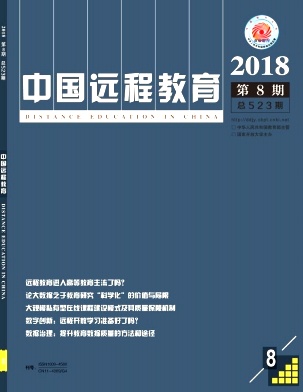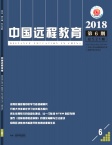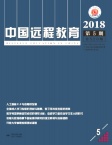Contents
- The learning quality and design of open education:The OpenEd Framework
- Blockchain-based digital badging for online learning
- Flipped classroom supported by online learning space and scaffolding theory: Deep learning design and practice
- Peer assessment and learning motivation in a mobile learning environment
- Learning analytics development trends in a multimodal data environment
- Teachers problem-solving behaviors in blended continuing professional education
- Social network analysis of collaborative knowledge construction in teacher workshops
- The adaptive efficiency of lifelong vocational skill training system in the Internet age
- Abstract
Contents
- Learning analytics research in China: A review of Chinese journal publications(2007-2017)
- International research on e-learning leadership: Themes, trends and implications based on a visual International research on e-learning leadership: Themes, trends and implications based on a visual analysis of keywords in Web of Science literature
- New norms of learning in the age of “The Internet + Education ”
- An empirical study on the influence mechanism of teacher trainees’learning behaviors in online education
- Exploring four decades of research in Computers & Education
- The positioning dilemma of community education in China
- A flat structured teaching and management mode: The case of Beijing Open University
- Analyzing the National Education Informationization Teaching Achievement Award winners
- Abstract
Contents
- ICT in Education 2.0: Trends and directions of Internet-facilitated educational transformation
- Carry out supply-side educational reform to promote structural transformation
- What can ICT in education do to speed up better education?
- Finding the soul of information technology
- From massive ICT infrastructure construction to deliberate planning and application of ICT in education
- ICT in education with Chinese characteristics can symbolize Chinese cultural self-confidence
- Effectively integrate good quality social resources to enhance higher education quality
- OU operating models and quality assurance mechanisms: An international comparison
- A study of innovation in OU operating mechanism
- Open Universities: The next phase
- The learning portfolio in higher education: A game of snakes and ladders
- MOOCs around the world in 2017
- Instructional interaction in distance education: A review of Chinese journal publications (2012-2017)
- Adaptive learning tools for K-12 in America
- Abstract

Contents
- Has distance education entered the mainstream of higher education?
-
Using big data to improve educational research
-
Construction mode and quality assurance of massive private online courses: The case
of the Open University of China -
Is open and distance learning ready for the digital innovations?
-
Data governance: Means and methods to improve the quality of educational data
-
Learning activities design problems and interactive digital course materials design
-
Evaluation index research on mobile learning tools: The case of museum app evaluation
-
Narrative programming using artificial intelligence: A gender-inclusive approach to learning
how to program -
Abstract

Contents
- ICT in Education 2.0: Essence and implementation
-
Cluster analysis of MOOC learners’characteristics: A literature review
-
Lifelong learning in West China: Results from a survey of Shanxi Province
-
Knowledge map of international research on self-regulated learning: Origin, present situation,
and development trends -
Adaptive learning: The premise, promise, and pitfalls
-
Learner support at Korea National Open University and Chinese open universities: A comparative study
-
Acceptance and utilization of synchronous classrooms in rural China: A study based on Technology
Acceptance Model -
Visualization analysis of hot topics in online course evaluation literature
-
Abstract

Contents
- Learner modeling in the context of educational data mining
-
Exploring diverse approaches to supporting OU learners: From the perspective of learning needs
-
On organizational commitment of OU faculty: A survey of the Open University of China
(Guangzhou branch) -
Optimization of automated testing for educational software: a case study of an online STEM subject
-
University of the Third Age: A global perspective
-
Limitations of local Lifelong Education Promotion Ordinance and suggestions on its legislation
-
Using blockchain technology to create a new ecology of OER
-
Mobile learning in continuing education degree/diploma programs
-
ICT-supported educational innovation in the Smart Age
-
Abstract

Contents
- Learner modeling in the context of educational data mining
-
Exploring diverse approaches to supporting OU learners: From the perspective of learning needs
-
On organizational commitment of OU faculty: A survey of the Open University of China
(Guangzhou branch) -
Optimization of automated testing for educational software: a case study of an online STEM subject
-
University of the Third Age: A global perspective
-
Limitations of local Lifelong Education Promotion Ordinance and suggestions on its legislation
-
Using block chain technology to create a new ecology of OER
-
Mobile learning in continuing education degree/diploma programs
-
ICT-supported educational innovation in the Smart Age
-
Abstract

Contents
- Artificial intelligence 2.0 and educational development
-
Delfi method and its application in China Horizon Project
-
Adult learning: global development and prospects from a sustainable perspective
-
Visionary leadership for digital transformation: in a time when learners take ownership of their learning
-
Interaction design in collaborative online courses: the case of the course Principles of Educational Communications
-
Optimum design in instructional videos in MOOCs: the case of the top 20 MOOCs in Class Central
-
Current landscape and development trend of intelligent assessment research under the background of
big data in education -
Impact of practice on accuracy in peer assessment: the case of the course 3D Animation Design and D Animation Design and
Modelling -
Investigation of part-time tutors in open universities: the case of Jiangsu Open University
-
Abstract